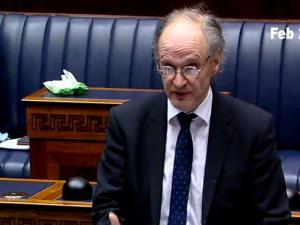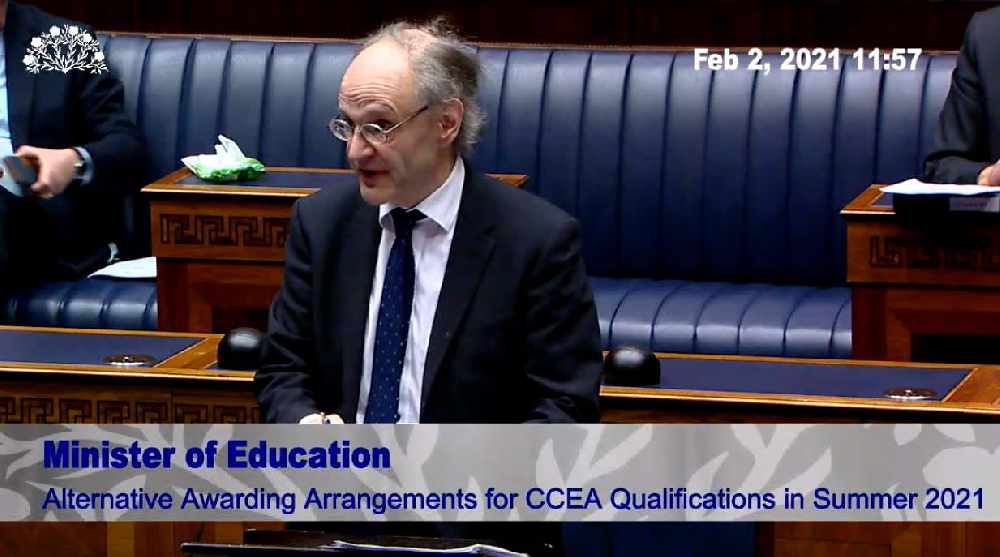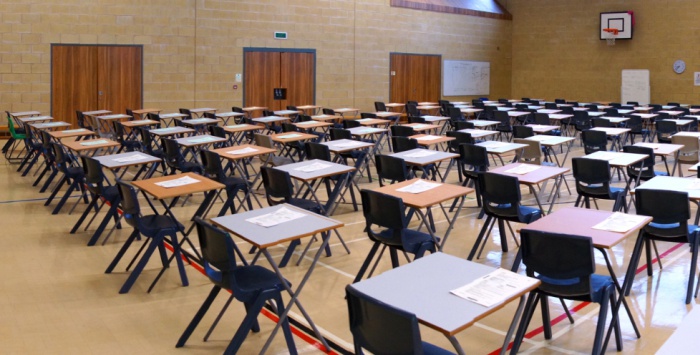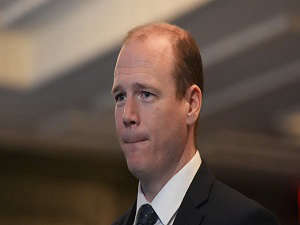
by Rebecca Black, PA
Schools will determine pupils’ GCSE and A-level grades in Northern Ireland, it has been announced.
All exams were cancelled for the second year in a row due to the coronavirus pandemic.
A statistical standardisation using an algorithm, which saw many grades lowered last year, will not be used in 2021.
There was an outcry from many schools, pupils and parents when the algorithm used to standardise results reduced more than a third of A-level grades predicted by teachers.
The algorithm was scrapped after days of controversy.
Stormont Education Minister Peter Weir told the Assembly on Tuesday that he believed exams are the “fairest and most robust method” for awarding qualifications and was disappointed these could not be held again this year.

Education Minister Peter Weir addressing NI assembly
He stressed fairness to pupils is his priority.
“In these exceptional circumstances, I have taken exceptional and unprecedented steps to ensure young people are supported to progress in education, training or employment,” he said.
Mr Weir told MLAs that lessons had been learned from last year.
He said local exam board the Council for the Curriculum, Examinations & Assessment (CCEA) will provide support and training to help teachers make holistic judgments to decide grades.
The CCEA will also provide the option to use assessment resources.
Mr Weir emphasised that these assessments are not exams and will not be treated as exams.
“The assessment resources can be used alongside a range of evidence and the emphasis should be on a broad portfolio of evidence, not a single source,” he said.
The CCEA will also carry out an external quality assurance process looking at the grades submitted by all schools and colleges throughout June.
Results days will remain as previously announced – AS and A-levels on August 24 and GCSEs on August 27.

Mr Weir also announced he will put in place indemnity arrangements to protect schools from potential legal challenges.
Other qualifications not set by the CCEA fall under the remit of the Department for the Economy.
Mr Weir said Economy Minister Diane Dodds expects to receive clarity on alternative arrangements for most vocational qualifications in March.
“In relation to essential skills and other Northern Ireland-only qualifications, the minister expects clarity on the alternative arrangements to be made available by the end of February,” he said.
Chairman of Stormont’s Education Committee Chris Lyttle said the “consequences of last year’s algorithm-based grading fiasco” continues to be felt, adding he knows of at least one pupil who remains involved in the appeals process.
In response to a question from DUP MLA Robin Newton, Mr Weir said he wants to ensure “there is fairness across the system” and a “level playing field” with other parts of the UK and the Republic of Ireland.
“I think there is recognition from universities that we have a system here which is within the ballpark of what other jurisdictions are going to be doing,” he said.
“That is the case for UK higher education and similarly the Irish Universities Association have been appraised of the Northern Ireland approach and have confirmed that across the board it will accept UK results by the exams boards and this has also been confirmed by the regulators so hopefully none of our students should be in any way disadvantaged.”


 Kneecap announce new song ahead of headline performance at London’s Wide Awake
Kneecap announce new song ahead of headline performance at London’s Wide Awake
 Gordon Lyons to attend first GAA match as Stormont Communities Minister
Gordon Lyons to attend first GAA match as Stormont Communities Minister
 Fresh appeal over 1973 murder of 18-year-old whose body was found in quarry
Fresh appeal over 1973 murder of 18-year-old whose body was found in quarry
 Kneecap say terror charge is ‘carnival of distraction’ and ‘political policing’
Kneecap say terror charge is ‘carnival of distraction’ and ‘political policing’
 Woman assaulted while jogging in West Belfast
Woman assaulted while jogging in West Belfast